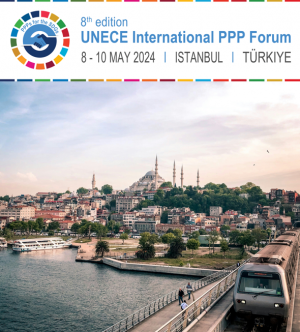As we move beyond the midpoint of the 2030 Agenda and with only 12% of the Sustainable Development Goals (SDGs) on track, an immediate, globally coordinated push to meet the 2030 deadline is urgently needed. Sustainable Public-Private Partnerships (PPPs) and infrastructure finance are central in implementing the SDGs, by placing people and the planet at the forefront for achieving the development agenda, reducing poverty, and mitigating climate change and conflict risks linked to inequality and exclusion.
Co-organized by UNECE and the Government of Türkiye, the 8th UNECE International PPP Forum is set to be a pivotal event in the global pursuit of sustainable development. Scheduled from 8 to 10 May 2024, in Istanbul, the Forum will bring together policymakers, experts and practitioners to discuss the contribution of sustainable PPPs and infrastructure finance to the priority topics of economic recovery, climate resilience, and the rebuilding of communities ravaged by natural disasters and armed conflicts.
Over 600 participants are expected to participate from national and local authorities, private companies, lenders, civil society, academia and international organizations. The plenary sessions of the Forum will assess the existing state of PPPs and infrastructure finance. These sessions will also serve as a platform for sharing ideas on how to scale up PPPs in order to accelerate progress toward achieving the SDGs by 2030.
The Forum will have 28 sessions over three days on topics ranging from digital transformation, green procurement, sustainable finance, gender equality and women empowerment, stakeholder engagement, climate resilient infrastructure, off-grid renewable energy, and small-scale PPPs.
The event will also be an opportunity to showcase 12 of the 38 projects submitted to UNECE in 2024, and how they contribute to sustainable development. All these case studies have been self-assessed using the UNECE PPP and Infrastructure Evaluation and Rating System (PIERS), one of UNECE’s flagship tools. Aimed at enhancing the rigor and credibility in the PIERS assessments with significant time savings for governments, the PIERS programme will be part of UNECE’s demand-driven capacity building and policy advisory services to its member States.
The discussions and outcomes of the Forum will feed into the numerous drafting teams of international experts working under the auspices of the Bureau of the Working Party on PPPs, to develop PPP standards, practical guides and policy recommendations for governments on these topical topics.


